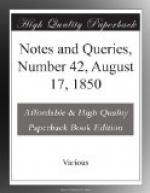The meaning here is not life ashamed, but life covered with shame. In this sense MR. HALLIWELL, apparently without knowing why, has adopted the term delightful; but then the two succeeding words of his explanation, “sweet, pleasant”, he would appear to have taken at random from a dictionary, forgetting that he was not using the word in its ordinary sense; for it is not possible that he can suppose Shakspeare to have used the word in the sense of the active participle. Now, though I do not think this at all the expression that Shakspeare would use, it is undoubtedly allowable as a general characteristic; but the word actually used would appear to imply the result of a particular action, which would have been productive of anything but delight. In short, as we are agreed that the word delighted in the passage in question in its present sense is unintelligible, so also are we, I think, agreed that the substitute, if any, must be used in a passive sense.
Now, with regard to the first instance furnished by MR. HALLIWELL of the use of the passive for the active participle, if I were sure that the delinquent were well out of hearing, and not likely “to rise again and push us from our stools,” I should be disposed to repeat the charge of impertinence against the editor who altered “professed” to “professing”. The word professed is one of common use, and in the present instance perfectly intelligible. “To your bosom, professed to entertain so much love and care for our father, I commit him,” seems to express the sense of the passage: a doubt is implied by the expression, but there is a directness of insult in the term professing quite inconsistent with the character of Cordelia.
“Becomed love” is love suited or fitted to the occasion. The use of the passive participle is every way more appropriate than that of the active, though the latter is more common now.
In the next instance, I have to observe that there is no such verb as to guile. Guile is a noun; and “guiled shore” is guile-covered, or charactered shore. According to this rule, the modern word talented, that is, talent-endowed, has been formed, it not having been considered that licences are allowed in poetry that are unsuited to ordinary language.
The passage next referred to is conditional, and I regard the use of the passive participle here, too, as correct.
I have thus reduced MR. HALLIWELL’S list to that number which usually forms the exception rather than the rule; and if accident, misprint, error in copying, or other special circumstance be not held sufficient to account for the single remaining instance, I have then only to say that I prefer deformed to deforming, as an epithet applied disparagingly to Time’s hand as more in accordance with Shakspeare’s practice, who was not in the habit of repeating the same idea, which, in the latter case, would occur again in the word “defeatures” in the following line.




